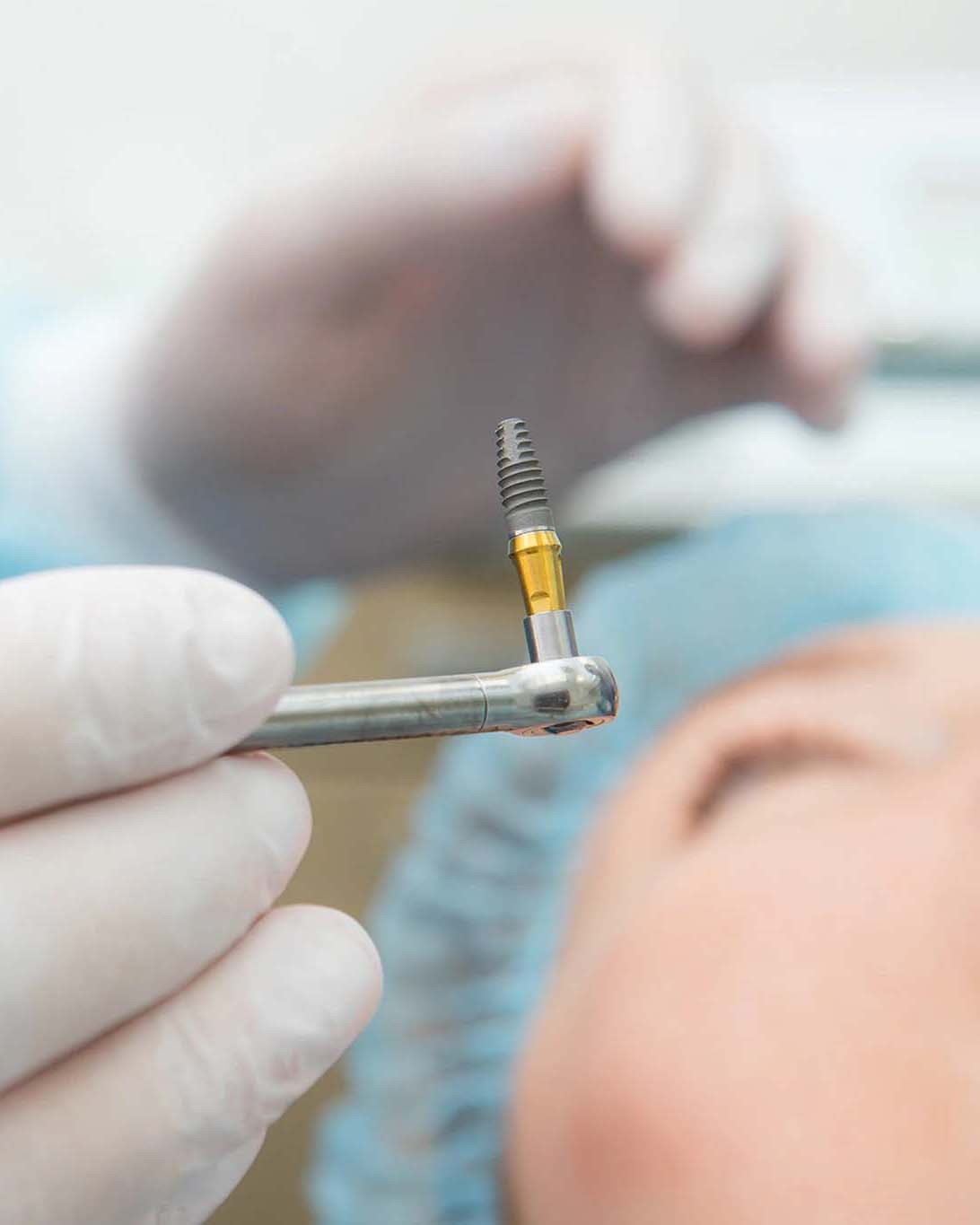
Dental Implants in Long Island City
Regain the full functionality of your mouth with dental implants.
The Foundation for a Confident Smile
Dental implants are artificial roots that provide a stable foundation for replacement teeth such as crowns, bridges, or dentures. Made from high-quality materials like titanium or ceramic, these small, screw-like fixtures are inserted into the jawbone through a minimally invasive procedure. As they integrate with the bone, implants mimic the function of natural tooth roots, restoring both appearance and function. At Gantry Oral & Maxillofacial Surgery, Dr. Miller and our experienced team use advanced techniques to ensure precise placement and patient comfort. Our implants not only enhance your ability to eat, speak, and smile confidently but also promote long-term oral health by preventing bone loss. With a focus on personalized care and lasting results, we are committed to improving your quality of life every step of the way.

Types of Dental Implants
Single
This is a replacement for a single missing tooth. The implant acts as an artificial root, supporting a custom crown that matches your natural teeth in both function and appearance.
Multiple
For a span of multiple missing teeth, implants can be placed at either end of the gap to support a fixed bridge. This creates a stable, long-lasting solution that restores both aesthetics and chewing function.
Full-Arch
Depending on the prosthetic plan prescribed by your dentist, implants are strategically placed to provide fixation for an overdenture, hybrid, or direct roundhouse bridge.
Remote Anchorage
In cases of severely atrophied upper jawbones, specialized zygomatic, piriform, and/or pterygoid implants allow anchorage of new teeth in ways conventional implants cannot.
KLS IPS®
A custom-made titanium framework that allows for fixture placement with less reliance on bone thickness than conventional implants.
Have questions? We've got answers.
FAQs
How long does the entire dental implant process take?
The timeline for dental implants can vary depending on individual circumstances, but typically ranges from 3 to 9 months. The initial implant placement usually takes 15-20 minutes per implant. After this, there's a healing period of about 3 months for osseointegration (where the implant fuses with the bone). If bone grafting is used, this may add 3-4 months to the process. Once healing is complete, the final restoration is placed with your dentist, which usually takes 1-2 appointments. We provide a personalized timeline during the consultation, considering factors like overall health, bone density, and the number of implants needed.
Are dental implants painful?
Most patients report that dental implant surgery is less uncomfortable than they expected. During the procedure, the area will be numbed with local anesthesia so you won't feel any pain. Some discomfort is normal in the days following surgery, but it's typically manageable with over-the-counter pain relievers. Many patients have reported it it to be less painful than a tooth extraction. We provide detailed post-operative instructions and may prescribe pain medication if needed. Most patients can return to work and normal activities within a day or two, although you may need to stick to soft foods for a while. Any discomfort usually subsides significantly within a week.
How long do dental implants last?
With proper care, dental implants can last a lifetime. The implant itself, which is the titanium post inserted into the jawbone, has a success rate of up to 98% and rarely needs replacement. The crown (the visible part of the tooth) typically lasts 10-15 years before it may need replacement due to normal wear and tear. However, with excellent oral hygiene and regular dental check-ups, many patients keep their original crowns for much longer. It's important to treat your implants like natural teeth - brush twice daily, floss, and visit your dentist regularly. We provide guidance on how to best care for your implants to ensure their longevity.
Who is a good candidate for dental implants?
While dental implants are a great option for many people, they're not suitable for everyone. Good candidates for implants generally have:
- Healthy gums free of periodontal disease
- Adequate bone density to support the implant
- Good overall health
- A commitment to oral hygiene and regular dental visits
Factors that might complicate implant treatment include uncontrolled diabetes, heavy smoking, or certain medications. However, even if you have one of these issues, it doesn't necessarily mean you can't get implants. We evaluate each patient individually, considering all aspects of their oral and general health. In some cases, preliminary treatments like bone grafting can make implants possible for patients who might not initially be ideal candidates.
How do I care for my dental implants?
Caring for dental implants is similar to caring for natural teeth, with a few special considerations:
- Brush twice daily with a soft-bristled toothbrush
- Floss daily, using implant-specific floss or floss threaders
- Use an antimicrobial mouthwash to reduce bacteria
- Avoid abrasive toothpastes that can scratch the implant surface
- If you have a removable implant-supported denture, clean it daily and remove it at night
- Attend regular dental check-ups and professional cleanings
- Avoid chewing on hard objects like ice or pens
- If you grind your teeth, consider using a night guard
We provide detailed care instructions tailored to your specific implant type and overall oral health needs. With proper care, your implants can provide a lifetime of comfortable, confident smiling.
